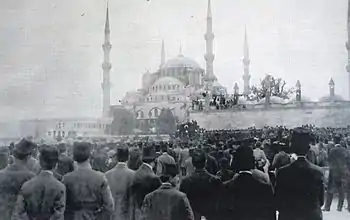Sultanahmet demonstrations
The Sultanahmet demonstrations (Turkish: Sultanahmet Mitingleri) were a series of rallies in 1919 held in Istanbul to protest the occupation of the Ottoman Empire following the Armistice of Mudros, especially the occupation of Izmir by Greek forces after the First World War. The largest of the demonstrations took place in Sultanahmet on 23 May 1919, with 200,000 people attending.

The first demonstration was organized in Fatih on March 1919 by İnâs Darülfünunu (Women's University) and the Association of Modern Women (Turkish: Asri Kadınlar Cemiyeti). On 19 May 1919, another protest was organized in Fatih by Türk Ocağı and attended by 50,000. On 20 May and 22 May, demonstrations were held in Üsküdar and Kadıköy respectively, organized by the Association of Modern Women.[1]
Many important figures of the Ottoman Empire participated, such as Mehmet Emin Yurdakul, Halide Edip Adıvar, Hamdullah Suphi Tanrıöver, Rıza Nur, Selim Sırrı Tarcan, İsmayıl Hakkı Baltacıoğlu, Fahreddin Hayri Bey, Kemal Mithad, Şükûfe Nihal Başar, and Madam Jeannine (a French Lady), who all called resistance against the foreign invasion.
Halide Edip was a major speaker during the Sultanahmet demonstration on 23 May 1919, stating the following:
Muslims! Turks! The Turk and the Muslims are now experiencing their darkest day. Night, a dark night. But there is no night without morning in life. Tomorrow we will create a glittering morning, tearing this terrible night. Women! We have now no tools such as cannons, guns; but a greater and a stronger weapon, we have; Hak and Allah. Guns and cannons may be lost, but Hak and Allah are everlasting. We, with our men, ask for the strongest, most intelligent, most courageous cabinet from our own heart that will represent us the best.[2][3]
The demonstrations were symbolic for the national awakening for Turks to carry out the Turkish Independence War. They were also key to the women's rights movement and feminism in Turkey, as women's activism and greatly increased visibility during the War of Independence constituted a turning point, greatly contributing to the expansion of women's rights.[1]
References
- Kaymaz, İhsan Şerif (2010). "Social Status of Woman: The Touchstone of the Contemporary Civilization". Ankara Üniversitesi Türk İnkılâp Tarihi Enstitüsü Atatürk Yolu Dergisi (in Turkish) (46): 333–366. Retrieved 6 January 2017.
- "Halide Edip Adıvar." Woman Writers of Turkey. Ozyegin University, n.d. Web. Retrieved 4 August 2013.
- Arabaci, Hacı Murat. "Milli Mücadelenin Hazırlık Safhasında Halide Edib Adıvar'ın Faaliyetleri Ve Mustafa Kemal Atatürk." Archived 2012-10-21 at the Wayback Machine Dumlupınar Üniversitesi. Dumlupınar Üniversitesi, 19 December 2007. Web. Retrieved 4 August 2013.